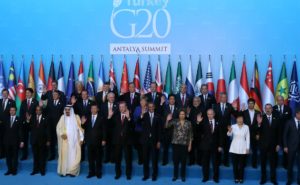The Face Project
Everything came to a halt in advance of the G20 summit. In Hangzhou, the host city of the summit, closed factories ensured blue skies and fresh air, delayed school start dates eased the traffic, and packages were detained for several rounds of inspection. The bustling West Lake lost almost all of its tourists, because going to Hangzhou before the two-day event was not worth the hassle for many. On the macro level, things did not unfold not that differently. Beijing went mute on the topic of South China Sea. Nationalist sentiment ebbed. Even the Chinese stock market and the Renminbi showed much less volatility. Immediately before the summit, China changed its face to a smiling and welcoming one, at least to the international community. Less than two months ago, China protested an international tribunal ruling that denied most of its claims in the South China Sea. People’s Daily, a state newspaper that the Publicity Department of the Party directly controls, published a set of sensational pictures on Weibo, the Chinese equivalent of Twitter, that concluded its stance and vowed to “not accept,” “not participate,” and “not acknowledge” the ruling. Meanwhile, the press continued to incite animosities against Philippines, Japan, and the United States. The nationalist sentiment reached such a height that people refused to purchase bananas from the Philippines, smashed random Japanese cars on the roads, and organized sit-ins at KFCs and McDonalds.
The Chinese are no strangers to superficial projects meant to save face. For instance, kids in elementary school receive training prior to some important official’s visits. School cafeterias prepare delicious food when parents come to campus. Couples stop bickering when their friends come over. The Party Leadership applies the same manner when hosting guests. The purpose of hosting these events, according to Jean-Pierre Cabestan of Hong Kong Baptist University, is to “give China a lot of face.”
For ordinary people, these projects disrupt daily lives. In Hangzhou, only cars with special permission can drive on roads. However, to take the metro, passengers have to go through a security check system stricter than that of the airport. Hotels require more identification from guests before checking in during the days of the event. Grannies are forbidden to dance in public areas. Police are present at almost every corner of the roads. Approximately 100 miles away, people in Shanghai suffer similar inconveniences, only to a lesser extent.
For the international community, though, this project does more good than harm. China made some real contributions for the pure reason of face. On September 3, a day before the G20 Summit took place, China and the United States, the two biggest greenhouse gas emitters in the entire world, formally ratified the Paris agreement. Although 23 other nations had ratified the agreement before China and the United States, they collectively accounted for only 1.08 percent of global emission. After the two countries jumped on board, the number rose to around 40 percent. Additionally the Chinese Communist Party has decided to tone down territorial disputes and extreme nationalism. Vice Foreign Minister Liu Zhenmin commented that “the page of the South China Sea arbitration has been flipped.” For the moment, China does look like a good world citizen.

